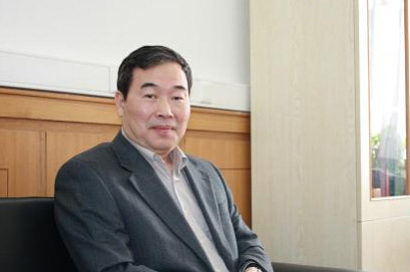UC Berkeley biologist Mu-ming Poo has been awarded the prestigious 2016 Gruber Neuroscience Prize for work showing how the brain’s circuitry changes in response to life experiences.
The prize, which comes with a $500,000 honorarium, was announced today by Yale University and the Gruber Foundation. It has been given annually since 2004 to scientists “whose groundbreaking work provides new models that inspire and enable fundamental shifts in knowledge and culture,” according to the prize website.
“I am deeply honored and pleased by the award,” Poo wrote in an email from Shanghai.
Poo, 67, is the Paul Licht Distinguished Professor in Biology Emeritus and the founding director of the Institute of Neuroscience (ION) at the Chinese Academy of Sciences in Shanghai, which has been a major player in boosting the quality of neuroscience research in China since its establishment in 1999.
“While remaining at Berkeley, he took the lead in building the Institute of Neuroscience into an exceptional institution,” said UC Berkeley colleague Marla Feller, a professor of molecular and cell biology.
Poo combined physics and biology early in his career to study the movement of cell-membrane proteins. This led to an interest in events at the synapse – the junction between two neurons – and then synapse formation and plasticity, the process by which the junctions change with nerve activity.
“Through his innovative and ingenious experiments, Mu-ming Poo has greatly advanced knowledge of mechanisms of brain plasticity – the ability to form new connections or change the strength of existing ones driven by our experiences of the world – in nerve cells,” said neuroscientist and 2015 Gruber prize-winner Carla Shatz of Stanford University in a statement. “He has enhanced our understanding of how synapses, the special junctions between nerve cells so crucial for all brain functions, are reinforced or weakened by neural activity.”
Poo’s research, Feller said, is unusually broad. He has contributed to at least five fields within neuroscience, many of which have to do with the various stages of development during which neurons are wired together to form circuits. He conducted research on the polarization of neurons during early development, which distinguishes the part of the neuron that receives inputs from other cells and the output; the molecular and cellular mechanisms by which nerve endings grow toward their desired target so that different regions of the brain connect to their appropriate target; maturation of the synapses that nerve cells make with muscles and which learn to control our movements; how the development of neural circuits in the brain is regulated by chemical factors called neurotrophins; and how synapses change with changing activity in the brain, so-called synaptic plasticity, which is critical for the developing brain to respond to environmental factors.
“His experiments are characterized by innovative and very often ingenious approaches to study some of the most important questions in cellular neuroscience,” Feller said.
“My work on synaptic plasticity over the years, much of which was done at Berkeley, have provided the rationale and the approach in using physiological and physical stimulation in the treatment of brain disorders,” Poo wrote. “In particular, we have shown how precise timing of electrical stimulation of a specific neural pathway is critical in altering the efficiency of synaptic transmission in neural circuits.
“With increasing understanding of specific neural circuit defects underlying various brain disorders, synaptic plasticity-based and circuit-specific stimulation approaches may become an attractive therapeutic approach in treating brain diseases, especially during the early phase of the disease onset. “
Poo, who was born in Nanking, China, in 1948 and raised in Taiwan, came to UC Berkeley in 2000 after having been on the faculties of UC Irvine, UC San Diego and Yale and Columbia universities. He graduated from Tsinghua University, Taiwan, in 1970 with a degree in physics and received his Ph.D. in biophysics from Johns Hopkins University in 1974.
Poo’s honors include the Javitz Neuroscience Investigator Award from the National Institutes of Health, the Ameritec Prize, the Ray Wu Society Award, the P.R. China International Cooperation Award and a Docteur Honoris Causa from the Ecole Normale Supérieure in Paris. He is a member of Academia Sinica, Taiwan’s scientific academy, and the U.S. National Academy of Sciences ,and a fellow of the American Association for the Advancement of Science.
The award will be presented to Poo in San Diego on Nov. 13 at the 46th annual meeting of the Society for Neuroscience.
For more info
